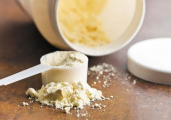Hidden Dangers Of Protein Powders
What is protein powder?
Protein powders are powdered sorts of protein that come from natural sources like eggs, milk or plants. These powders usually include other ingredients like added sugars, artificial flavouring, and thickeners, meant to reinforce texture and taste.
Protein powders could seem sort of a quick and straightforward fix to satisfy your protein requirements, but they are available with their own set of problems, posing variety of health risks.
Hence variety of doctors advise against them or recommend that they're consumed under supervision.
Here are the key dangers of protein powders:
Imbalanced Nutrition
Consuming protein powders can cause diet imbalance by disproportionately increasing the protein intake at the expense of other vital nutrients. this might actually end in nutritional deficiencies, leading to you having to consume more supplements or maybe medication to revive equilibrium.
Digestive Problems
Protein powders may cause digestive problems in cases once they aren’t fortified with dietary fibre. A high protein diet barren of fibres can cause digestive ailments like constipation, diverticulitis and other problems. Additionally, milk-based protein powders cause gastrointestinal discomfort in people that suffer from dairy allergies or lactase deficiency . Whey milk contains concentrated doses of compounds like lactoferrin which can cause gut flora, resulting in an indigestion and gastric problems.
Kidney issues
Protein supplements can cause kidney problems. The kidneys are liable for filtering out toxins and waste products from the bloodstream. High protein consumption increases the acid load on the kidneys and increases the probabilities of getting kidney stones. Over the future , consuming protein supplements may negatively affect kidney function.
Toxins and heavy metal contamination
A report released by a non-profit group called the Clean Label Project indicates that variety of protein powders available within the market contain traces of heavy metals like lead, arsenic, cadmium, and mercury, proven to be toxic to the health of a private .
Weight gain
Protein powders, being high in added sugar, can increase the quantity of calories being consumed on an everyday basis. Some powders have the maximum amount as 23g of sugar per scoop, in turn, adding the maximum amount as 1200 calories to a glass of milk. this will cause unhealthy weight gain and also spike the blood glucose levels.
What’s in Your Protein Powder?
When comparing and buying sports nutrition powders, consumers should pay close attention to the list of ingredients. Additives, like caffeine, creatine, and sweeteners, are sometimes in these powders but aren't mentioned in advertisements. When consumers are unaware of those additives, they will be especially harmful. for instance , consuming several cups of coffee or tea throughout the day additionally to a protein powder that contains caffeine could have unpleasant side effects, including tremors, migraines, and insomnia.[3] Creatine, a well-liked sports supplement, increases the quantity of water in your muscle cells, resulting in significant weight gain and putting you at a better risk for dehydration, stomach pain, and muscle cramping.[4][5] Creatine are often particularly dangerous for people with kidney or disease and has not been studied for safety in children or adolescents under the age of 18.[6] additionally , the American Heart Association recommends a daily added sugar limit of 25 to 36 grams, but some protein powders have the maximum amount as 23 grams of added sugar per scoop.[7][8] Others contain artificial sweeteners like sucralose or aspartame, which may be harmful in large quantities. For these reasons, consumers got to know exactly what's in their daily protein shakes and the way it's going to affect their health.
Toxins and Contaminants
Unfortunately, rummaging through the list of ingredients sometimes isn’t enough. In early 2018, an independent, nonprofit organization, Clean Label Project, released the results of a study during which over 130 of the best-selling protein powders were tested for levels of pesticides, heavy metals, bisphenol A (BPA), and other unsafe contaminants.[9] About three-quarters of the powders tested contained detectable levels of lead and cadmium, both of which may cause permanent health concerns, including kidney and brain damage.[10] About half the powders contained detectable levels of BPA, which disrupts hormones and is linked to numerous health issues. One product was found to contain over 25 times the regulatory limit of BPA in only one serving.[11]
Unfortunately, “organic” products were no better; actually , products labeled “organic” contained on the average over twice the amount of heavy metals of conventional products. Many Americans consume these sports nutrition powders as a part of a healthy, exercise-filled lifestyle, not realizing that the contaminants have the potential to cause serious and, in some cases, irreversible damage to their bodies.
What do you have to Do Instead?
Many Americans think that more protein is best . The recommended daily allowance (RDA) is 0.8 grams of protein per kilogram of weight .[12] consistent with this guideline, someone who weighs 140 pounds should consume roughly 50 grams of protein per day, the equivalent of 6 ounces of lean meat, 5 ounces of nuts, or 20 ounces of tofu. Contrary to common belief, consuming far more than recommended amounts of protein can even have harmful effects on your bones, kidneys, and live
Hidden Dangers Of Protein Powders
Write a Review for Hidden Dangers Of Protein Powders |
RECENTLY UPDATED REVIEWS
Auto Transportation Service Loxahatchee
Tennessee Standard Plumbing and Drain
Real Estate Agent Miamisburg
Auto Repair Shop Little Elm
Stone Engraving Phoenix
HomeKind Restoration 365
House Cleaning, Home Services
Professional cleaning services
Prestige Chimney Services
My Own Staff
REQUESTED REVIEWSREVIEWS BY CATEGORY |

